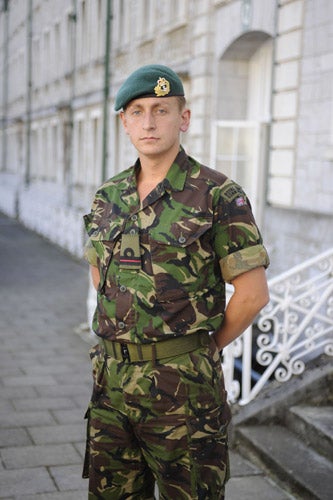First person: 'I treat casualties on the front line'
Surgeon Lieutenant Henry Dowlen, 3

I know that I have seen a lot at a young age, but no matter how old you are, you can never truly prepare for the wide range of situations you face as a medic in a war zone; a lot of the time you simply have to learn your way as you go along. I spent 10 years in the Royal Navy and was a reservist in London before I qualified as a Naval medical officer. Last winter – a time when 60 per cent of the British effort in Afghanistan was made up of marines – I was stationed at the largest forward operating base in Helmand Province. For five months while I was there, I was the only qualified doctor in charge of a team of between two and five medics, and as such I was on call 24 hours a day.
Most days in the operating room followed a similar routine. In the morning I'd be doing general practitioner's work, with the odd tropical disease case thrown in; lunchtime was generally when the emergency patients would arrive. By the afternoon there'd be lots of administration to go through – meeting with locals to discuss public-health issues, and all the while coordinating my fellow medics who worked part of the time at camp with me, and the rest of the time out on patrol with the troops. In the evening, assuming all had gone smoothly with my military duties during the day, I'd be a watch-keeper, which meant I'd be helping to keep tabs on where our troops were, and just generally being on hand.
Our base had the highest casualty rate of all those in Afghanistan, and we could never predict what we'd be met with at any time. On average, there was roughly one casualty a day, but they often came in clusters. Wounds could be very severe and a significant number of people died in our facility. In cases where our men had been hit on the ground, we'd usually get a call in advance saying one of our boys had been shot or blown up and then we would have five or 10 minutes to prepare before they were brought back to camp. But being located in Sangin, we were not only dealing with injured troops. There is a population of 60,000 people in that part of the country and very few local doctors in the area; on a regular basis civilians would arrive without any warning, having been caught up in the crossfire, and these cases would be very hard to negotiate.
Families would arrive pushing victims in wheelbarrows, having trudged them through the dusty heat, so they would be in a terrible state by the time they arrived. Our guys wear body armour so their injuries would be to the head or limbs which, once you get used to it, is relatively straightforward to deal with. But local people don't have this, and Afghan rebels tend to use knives so we would often be presented with deep torso wounds, which can be extremely challenging technically. Inevitably, people would come to us alive, but despite our best efforts, they would die in our care, and there was nothing we could do about it.
There are also cultural traditions which make it harder to treat Afghan women and children. Women often arrived covered in a sheet and would be reluctant to lift it up in order for us to tend to their wounds. But you have to treat the Afghans with the same respect and medical treatment as you do with your own boys, which is hard for some of our staff to recognise at first.
Although I was only in Afghanistan for five months, the tour of duty lasted 18 months in total. There was the initial preparation period and then a huge burden of responsibility once I returned home. A number of troops, unfortunately, are left with long-term and life-changing injuries. I have to ensure that they get support once they're back home. As a community we need to maintain sight of the fact that injured soldiers require care for the rest of their lives. Rehabilitation is a long and delicate process.
Join our commenting forum
Join thought-provoking conversations, follow other Independent readers and see their replies
Comments
Bookmark popover
Removed from bookmarks